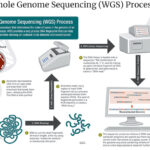We talk a lot about cross-contamination here at Food Poisoning Bulletin. Cross-contamination is simply transfer of pathogens from one food to another, or to a surface. It is responsible for many cases of food poisoning caused by pathogens such as E. coli and Salmonella every year in the United States. So what is cross contamination and how can you prevent it? There are many different types of cross-contamination. It can occur while harvesting food, processing it, during transportation, while shopping, in the kitchen, and during food service. We are mostly concerned with consumer behavior here. Direct cross-contamination occurs from food to food contact. Indirect cross-contamination occurs when bacteria are transferred from your hands or utensils from one food to another. To … [Read more...]
Schoonover Farms Raw Milk and Cream Recalled in WA For Possible E. coli
Schoonover Farms raw milk and cream are being recalled in Washington state for possible E. coli contamination, according to the Washington Department of Health. The dairy is located in Odessa, Washington. No illnesses have been reported to the company as of December 23, 2021 in connection with the consumption of these products. The products are retail raw whole milk and cream. The items have best by dates of December 23, 2021 through January 2, 2022. The milk and cream are packaged in 8-ounce, quart, half-gallon, and 1-gallon bottles. They are sold to local consumers in Odessa, and to Rosauers and Yoke's Fresh Market locations in Spokane, Washington. Retail raw milk is legal to sell and buy in Washington state, but risks to health are serious. A warning label is required on all … [Read more...]
FDA Proposes Agricultural Water Safety Rule For Use on Produce
There have been multiple E. coli outbreaks linked to fresh produce, especially leafy greens such as romaine lettuce, in the past few years. In several of those outbreaks, agricultural water has been implicated as the source of that pathogen. So the FDA has proposed a new agricultural water safety rule for use on produce. The rule would require farms to conduct comprehensive assessments that will help them identify and mitigate hazards in water that is used to grow produce. This is the latest step in the implementation of the Food Safety Modernization Act (FSMA) of 2011. This proposed rule will replace some of the existing requirements for agricultural water in the Produce Safety Rule. Frank Yiannas, FDA Deputy Commissioner for Food Policy and Response said in a statement, "There … [Read more...]
E. coli Illnesses Are Increasing in Wyoming, According to Health Department
E. coli illnesses are increasing in Wyoming, according to that state's health department, along with cases of norovirus. This information, in a press release from the Wyoming Department of Health (WDH), offered no specifics as to patient ages, hospitalizations, or any hints about possible sources. Norovirus is likely among the increase in gastrointestinal illnesses, but Matt Peterson, WDH surveillance epidemiologist, said in a statement, "We are specifically seeing increased reports of E. coli across the state recently compared to previous years, which can be particularly concerning in children under 5." The symptoms of norovirus and E. coli are similar up to a point, but norovirus is usually a self-limiting illness, and people who contract this infection usually do not seek … [Read more...]
St. John Creamery Raw Goat Milk Recalled For E. coli
St. John Creamery raw goat milk is being voluntarily recalled for possible E. coli contamination in Washington state. The same product was recalled in September 2021 for possible Listeria monocytogenes contamination. No known illnesses are associated with the consumption of this recalled goat milk at this time. The recalled product is St. John Creamery raw goat milk that is bottled in half-gallon and one-pint containers. It was sold at the dairy's on farm store, directly to private customers in drop groups, and at retail stores in western Washington state. The milk has best by dates through 110521 (November 5, 2021). It is legal to sell and buy raw milk in Washington state, but all of these products must have a warning label that details the risks of consumption. You can see a … [Read more...]
Produce Contamination Is E. coli Blowing in the Wind?
The Center for Produce Safety is awarding grant money for a study to evaluate the risks of E. coli being carried in the wind on dust. For the issue of produce contamination is E. coli blowing in the wind? E. coli bacteria can survive in dust; in fact, an NIH study conducted in 2016 found that the pathogen can live in dust samples for 20 years. Here's how this works: Cattle carry pathogenic E. coli bacteria in their guts and excrete it in the feces. The feces contaminates soil in the area, which can then dry and become airborne in dust. The problem is that if the pathogen is in dust from factory farms, it can travel on the wind to produce fields and contaminate vegetables, especially romaine lettuce. That lettuce's unique physiology makes it easy for bacteria to collect in its … [Read more...]
Williams Valley Family Farm Raw Milk Recalled For E. coli Contamination
Williams Valley Family Farm raw milk has been recalled because it may be contaminated with E. coli bacteria, according to the Washington state Department of Health. The dairy is located in Clayton, Washington. There is no post on the Department of Health agency's website about this recall, but an email alert has been distributed. No reports of illness due to the consumption of this raw milk have been reported to the company or to public health officials as of October 14, 2021. The milk was shipped to retail locations in eastern and western Washington state. Public health officials will provide more distribution details when they become available. It is legal to sell raw milk at the retail level in that state. The raw milk was distributed in gallon and half-gallon containers. … [Read more...]













